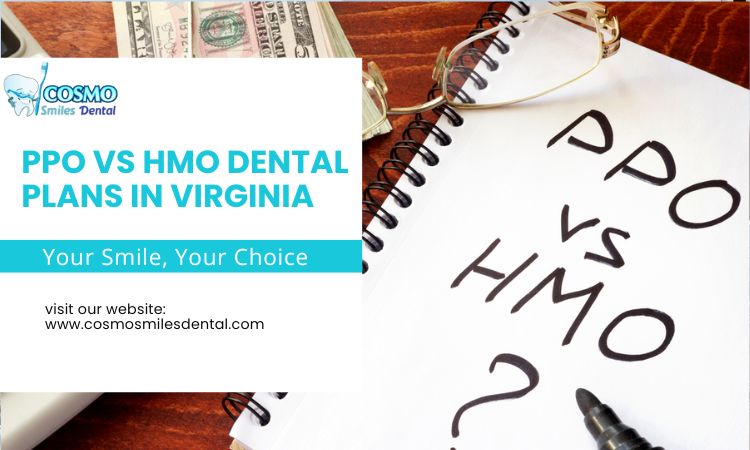When it comes to protecting your smile, choosing between PPO vs HMO dental insurance can feel like navigating a maze of benefits, limitations, and fine print. If you live in Virginia, understanding these two popular dental insurance models can help you make the smartest decision for your oral health and your wallet.
What Is PPO Dental Insurance?
A Preferred Provider Organization (PPO) dental plan offers flexibility in choosing your dentist. You can visit any licensed dentist, but you’ll pay less if you choose one from the plan’s preferred network.
Key Features of PPO Plans:
- Flexibility: See any dentist, in-network or out-of-network.
- Higher Premiums: The monthly fees are often higher than those associated with HMO plans.
- Partial Coverage for Specialists: Often covers specialists without referrals.
- Annual Maximum: There’s usually a cap on the total benefits per year.
What Is HMO Dental Insurance?
A Health Maintenance Organization (HMO) dental plan requires you to choose a primary care dentist from the plan’s network. To see a specialist, you’ll usually need a referral from your primary dentist.
Key Features of HMO Plans:
- Lower Premiums: More affordable monthly costs.
- Restricted Network: Coverage applies only to dentists within the network.
- No Annual Maximum: Many HMO plans don’t have yearly limits.
- Preventive Focus: Strong emphasis on preventive care like cleanings and exams.
PPO vs HMO Dental Insurance in Virginia: Side-by-Side Comparison
| Feature | PPO Plan | HMO Plan |
| Choice of Dentist | Any dentist (best savings in-network) | Must choose from plan’s network |
| Premiums | Higher | Lower |
| Specialist Access | No referral needed | Referral required |
| Annual Maximum | Yes, typically $1,000–$2,000 | Often no maximum |
| Out-of-Network Coverage | Yes, partial | No |
| Preventive Care | Covered, often 100% in-network | Covered, often 100% |

Which Is Right for You in Virginia?
- Choose a PPO if you:
- Want freedom to visit any dentist.
- Don’t mind paying higher premiums for flexibility.
- Need coverage for specialists without extra steps.
- Choose an HMO if you:
- Are looking for the most affordable monthly cost.
- Are comfortable staying within a specific network.
- Want predictable out-of-pocket expenses.
Virginia-Specific Considerations
- Dentist Availability: In some rural areas of Virginia, PPO networks may have more providers than HMO networks.
- Specialist Access: If you anticipate needing orthodontic or oral surgery care, PPOs may be more convenient.
- Local Dental Practices: Some offices, like Cosmo Smiles Dental, participate in both PPO and HMO networks, giving you flexibility if you switch plans later. You can also explore our guide to PPO dental insurance options in Virginia to understand how these plans work with local providers.
Final Thoughts
The PPO vs HMO dental insurance decision in Virginia comes down to balancing cost, convenience, and care flexibility. PPO plans generally cost more but offer freedom of choice, while HMO plans save money but limit your provider options. The smartest choice is the one that fits your dental care habits, budget, and location.
Ready to find the right dental insurance fit and a trusted dentist in Virginia? Contact Cosmo Smiles Dental today to book your appointment and get expert guidance on making the best choice for your smile.
FAQs
1: Is PPO dental insurance always better than HMO?
Not necessarily. PPO offers more flexibility, but HMO plans are more affordable and may be a better fit if you’re comfortable with network restrictions.
2: Can I switch from HMO to PPO mid-year?
In most cases, you must wait for open enrollment unless you have a qualifying life event.
3: Do PPO and HMO plans in Virginia cover cosmetic dentistry?
Typically, neither plan covers elective cosmetic procedures like teeth whitening, though PPOs may offer partial discounts.
4: Does an HMO plan cover emergency dental care out-of-network?
Many HMO plans cover emergencies anywhere, but routine care must be done in-network.
5: Are there dental plans in Virginia that combine PPO and HMO features?
Yes, some insurers offer hybrid or “POS” (Point-of-Service) plans, blending PPO flexibility with HMO cost control.
